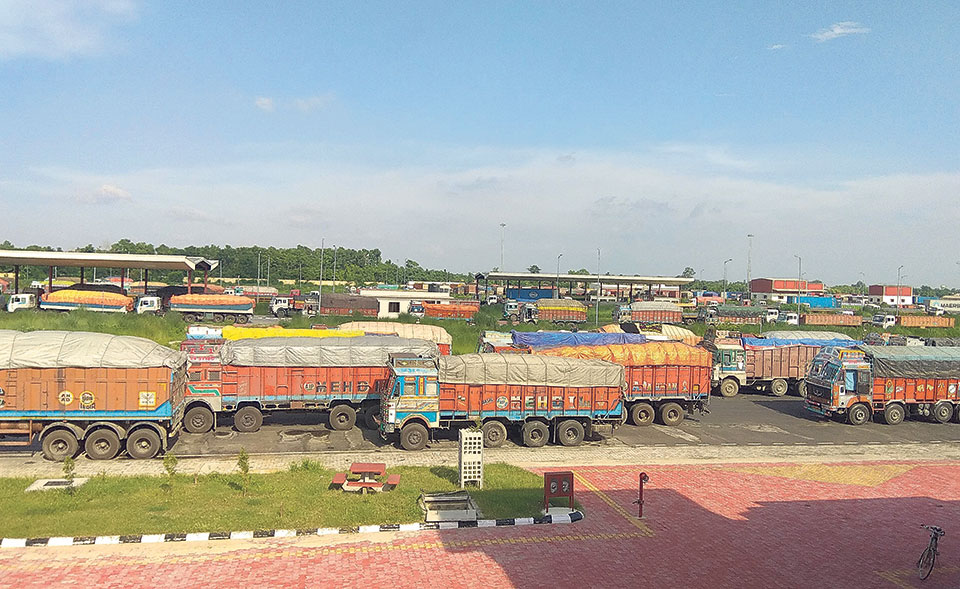
OR
Nepal’s trade deficit declines by one fourth in first two months of current fiscal year
Published On: September 28, 2020 07:30 AM NPT By: RAJESH KHANAL

A sharp fall in the import of fossil fuels gave cushion to check the outflow of foreign currencies
KATHMANDU, Sept 28: Nepal’s trade deficit during the period of mid-July to mid-September declined by 24.93 percent, significantly lowering the import expenses.
Records maintained by the Department of Customs show that the country’s imports in the first two months of the current fiscal year declined by 22.07 percent to Rs 178.84 billion. During the same period last year, imports fell by 1.22 percent.
According to the officials of the Ministry of Industry, Commerce and Supplies, the notable fall in imports this year was due to the import restriction measures and lockdowns enforced by the government.
The exports on the other hand increased by 10.49 percent to Rs 20.44 billion. With an improvement in the trade position, the imports to exports ratio fell sharply to 8.75 from 12.40 earlier. It means that Nepal is now importing goods worth Rs 8.75 for every export of Re 1.
The decrease in the consumption of fossil fuels was seen as a major contributor to the downfall of the country’s total imports expenses. With the restrictions in vehicular movement during the lockdown, the country’s expense on petroleum products fell almost to one-third. According to the department, Nepal spent Rs 8.71 billion, a straight fall from Rs 27.14 billion in the review period last year.
Since Nepal enforced a nationwide lockdown on March 24, the movement of public transport and airplanes mostly came to a halt for more than five months. As a result, imports of both diesel and aviation turbine fuel (ATF) declined heavily. While ATF imports fell to Rs 189.47 million from Rs 1.76 billion, diesel consumption was down to around Rs 5 billion from Rs 14.67 billion.
Likewise, petrol consumption stood almost halved to Rs 3.40 billion. There was a nominal fall in the imports of cooking gas, from Rs 4.36 billion to Rs 4.17 billion. In the first two months, shares of fossil fuels in total import value was five percent, compared to around 12 percent in the review period last year.
During the period, the export of processed soybean oil, yarn and woolen carpets topped the export earnings. Nepal exported processed soybean oil worth Rs 5.47 billion. Similarly, the export of yarn and woolen carpets stood Rs 1.80 billion and Rs 1.32 billion, respectively.
Iron and steel products, jute sacks and readymade garments were also among the major exports that gave the country significant earnings over the period.
You May Like This

Nepal’s trade deficit declines 5.8 percent to Rs 600 billion in first half of current FY
KATHMANDU, Jan 22: Nepal has been importing goods worth more than Rs 100 billion a month on an average, compared to... Read More...

Nepal’s trade deficit declines nearly 11 percent to Rs 475.44 billion
KATHMANDU, Dec 24: Nepal’s trade deficit in the first five months of the current fiscal year declined by 10.91 percent... Read More...

Faltering exports drive up trade deficit with China
KATHMANDU, April 28: Exports growth to China, the second largest trading partner of Nepal, has been falling in the current Fiscal... Read More...

Just In
- Speaker Ghimire administers oath of office and Secrecy to JSP lawmaker Khan
- In Pictures: Families of Nepalis in Russian Army begin hunger strike
- New book by Ambassador K V Rajan and Atul K Thakur explores complexities of India-Nepal relations
- Health ministry warns of taking action against individuals circulating misleading advertisements about health insurance
- UAE secures spot in ACC Premier Cup final, defeating Nepal by six wickets
- NC to boycott Gandaki Province Assembly, submits letter to Speaker
- 850 grams of gold seized from Indian national at TIA
- Rupandehi District Court orders to release Dipesh Pun on a bail of Rs 400,000











_20240419161455.jpg)



_20240311121839.jpg)

Leave A Comment